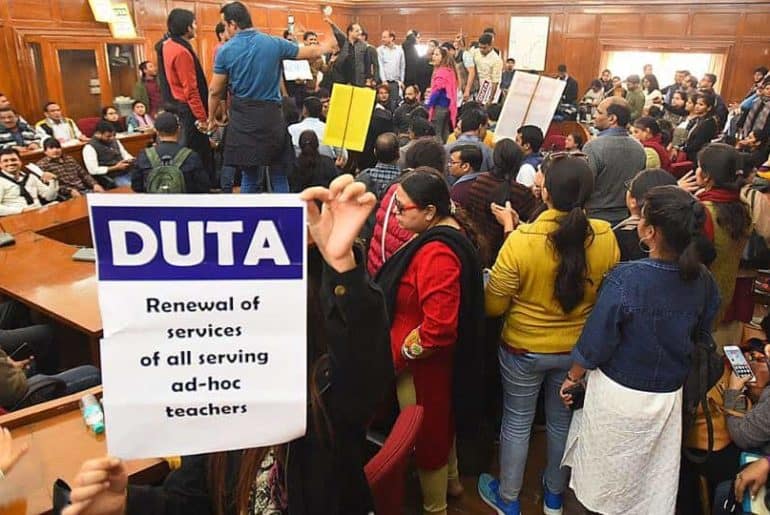Delhi University Teachers’ Association (DUTA) recently revealed a survey done on around 700 ad-hoc teachers, highlighting their demographic profiles and working conditions to revalidate ‘One-Time Absorption’ as the only way to alleviate the young teachers and their conditions.
In a press statement released on 5th February 2020, DUTA revealed information about the demographic profiles and working conditions of the ad-hoc teachers of the University. According to the survey, over 4500 teachers at the University of Delhi are working on an ad-hoc or temporary basis, as permanent appointments haven’t taken place in over a decade. All the ad-hoc teachers fulfil the minimum eligibility criteria as per UGC regulations. 80% have higher qualifications and 88% are NET qualified. Nearly half the respondents have worked in one institution – this suggests that institutions are satisfied with the performance of the teachers and are benefitting from the contributions these teachers make to the academic and corporate life of the institutions. The data also shows that most Ad-hoc teachers are only able to pursue academic activities at great cost – without any leave or only during vacations, and nearly 25% are unable to pursue any academic activity at all.
“Recruitment was done sporadically in two brief periods, first in 2014-15 and then in 2017, in few colleges/departments. The recruitment process, which started because of a High Court Order of December 2016, was brought to a complete halt because of the 5 March 2018 UGC notification for the implementation of Department/Subject-wise roster. It took over a year for the issue to get resolved. However, meanwhile, all advertisements for permanent appointments over 2700 posts lapsed. The change in screening criteria and recruitment process as per UGC Regulations 2018 now threatens the prospects of a vast majority of these teachers,” the Statement read.
The ad-hoc teachers have the same qualifications as permanent teachers- fulfilling all the requisite academic qualifications like NET/JRF, M Phil, PhD, Post-doctorate etc. from prestigious Universities of India and abroad, and having teaching experience for years- and perform the same functions in their colleges and institutions as permanent teachers, and still, are denied job security. They receive no facilities like annual increments, medical benefits, maternity leaves, etc. and the duration of their tenure depends largely on the whims of the administration of their institutions, as stated by the press release. “This is also reflected in the findings as women constitute 57% of the workforce and most of them are either unable to plan their families or face extreme hardship during their pregnancies. Many are forced to leave their job – this is not reflected in the survey as only those who were able to get back their job figure in the survey.”
DUTA and the University’s teachers have been agitating for over 2 months now to press for demands related to their service conditions, including pensions, promotions, and permanency in jobs, claiming that these policies stand in stark violation of not only the Statutes and Ordinances of the University of Delhi but also of UGC Regulations which have stipulated maximum 10% for such vacancies and also go against the spirit of various court judgements and violates the fundamental rights of the affected teachers including the right to equal wage for equal work. “Various State Governments have initiated such processes of regularization for teachers in their State Universities through notified executive orders. Even the Government of NCT, Delhi, through the Governing Bodies in the colleges maintained by the Delhi Government, has shown willingness towards the process of regularization: many of these Governing Bodies have passed resolutions recommending a one-time absorption of all working temporary/ad-hoc teachers which now needs sanction from the UGC and the MHRD. In 2009, the UGC had asked Universities/Institutes to absorb UGC Research Scientists working in the units.
Today, when over 50% population is below the age of 25 years, it is important to strengthen public funded educational institutions. Infrastructure development and maintaining adequate teachers’ number are essential for quality education. It is important that University and its colleges, which serve lakhs of students from across the country, are stabilized through permanent faculty,” DUTA said.
DUTA recommends that the UGC should frame a specific Regulation as a one-time measure for the absorption of the temporary/ad-hoc teachers in the University: a provision for teachers to be absorbed against vacancies which are approved and earmarked according to the DoPT Reservation Roster for teaching positions. Their ongoing struggle has led to the MHRD to recognize that no adhoc teacher be removed until permanent recruitment is done.
Feature image credits: Satviki Sanjay for DU Beat
Shreya Juyal

















